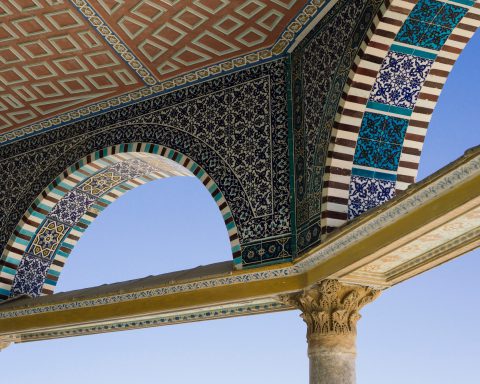Does the name Mohammed Mossadegh ring a bell for you? For your congregation? It did not for the New York Times when it published the article “The Tension between America and Iran, Explained”. A major boulevard in Tehran is named for this historical figure of the 20th century, but in the US, his name has been all but forgotten. When Americans think about the initial rupture of US relations with Iran, they tend to think about the hostage crisis of 1979.
Historical amnesia is one of the attributes of power, just as searing memories of injustice are passed from one generation to the next among those who have been victimized. This cognitive gap only exacerbates the tensions between individuals and groups and poses a major impediment to eventual reconciliation. It keeps conflicting parties in separate universes. One only need recall the ease with which President George W. Bush could proclaim that 9-11 occurred “because they hate us for our freedoms”[1] rather than recount decades of painful history.
The Syria Lebanon Partnership Network’s new study guide, The Burden of Memory and the Hope of the Gospel, seeks to restore memory to us here in the West by looking at the war in Syria from a regional perspective. The story of Mohammed Mossadegh, the democratically elected prime minister of Iran who was overthrown by the CIA working with British operatives in 1953 when he attempted to nationalize his nation’s oil, is widely known in the Middle East. The coup, or Operation Ajax, which was declassified in 2000, is viewed in the Middle East as part of a long chain of invasions, regime changes and other aggressions coming from the West with the attempt to remove Bashar al-Assad as president of Syria as only the most recent example.
Perhaps the most important memory to be retrieved regarding the Middle East is the Sykes-Picot Agreement of 1916, a secret treaty between France and the UK, that, with Russian and Italian consent, divided up the failing Ottoman Empire between them with the exception of the Arabian peninsula. The UK had already promised Arab leaders, notably Hussein bin Ali, Sharif of Mecca, recognition of an independent state in Greater Syria in exchange for their help in defeating their mutual enemy, the Ottomans.[2] Hussein proceeded to lead The Great Arab Revolt against the Ottomans. For a brief period after the 1918 Armistice, a nascent constitutional monarchy, the Arab Kingdom of Syria, functioned in Damascus claiming territory for a Greater Syria spanning modern day Syria, Lebanon, Israel/Palestine and Jordan. And the British created Iraq and put Hussein’s brother Faisal on the throne there. But in 1919, they abandoned the Arab Kingdom to its fate when they withdrew their representatives from Damascus, allowing the French to invade and claim the territory promised to them under Sykes-Picot, Syria and Lebanon while the UK took possession of Iraq, Jordan and Palestine.
The betrayal of their Arab allies was embodied in subsequent treaties at the end of World War I, most notably the Treaty of Versailles which formally ended the war and established the League of Nations. It was the newly formed League of Nations which gave the rationalization for this new era of colonialism under the rubric of “mandates” which transferred the territories of the former Ottoman Empire and its major ally, Germany, into the hands of the victors for a period of “tutelage” for peoples “not yet able to stand by themselves under the strenuous conditions of the modern world.”[3] The Levant region was considered a “Class A Mandate” requiring a relatively short albeit unspecified period of this “civilizing mission” according to Article 22 of the Covenant of the League of Nations:
Certain communities formerly belonging to the Turkish Empire have reached a stage of development where their existence as independent nations can be provisionally recognized subject to the rendering of administrative advice and assistance by a Mandatory until such time as they are able to stand alone. The wishes of these communities must be a principal consideration in the selection of the Mandatory.[4]
The United States was ultimately denied membership in the League of Nations by its own Senate, but in the interval before the formal establishment of the mandates, the US managed to commission a survey of popular opinion among the people slated to live under them. The King-Crane Commission traveled throughout the Levant in the early summer of 1919, taking the pulse of public sentiment as best it could under difficult circumstances. It found that only the Maronite Christians of Lebanon unreservedly favored a French mandate while other groups desired an independent Greater Syria. The Commission met with Arab notables in Damascus and reported them saying:
Considering the fact that the Arabs inhabiting the Syrian area are not naturally less gifted than other more advanced races and that; they are by no means less developed than the Bulgarians, Serbians, Greeks, and Roumanians [sic] at the beginning of their independence, we protest against Article 22 of the Covenant of the League of Nations, placing us among the nations in their middle stage of development which stand in need of a mandatory power.[5]
The Commission recommended the unity of Greater Syria be preserved and placed under an American mandate despite its own findings of a preference for independence. It warned of the effects of Zionism on the cosmopolitan area of Palestine and the necessity of military force to establish a Jewish State. Its report was kept from public view until 1922 when the train of events was unstoppable.
The French and British used divide-and-rule strategies perfected in Africa to govern their new “mandates”. This entailed fostering an alliance with a favored minority: the Alawites of Syria, the Maronite Christians of Lebanon and the Sunni of Iraq. Local elites of all religious sects found it necessary to collaborate with the colonial powers to maintain their power and privilege. Upon independence after World War II, these political elites found they were unable to assume the reins of the state as their collaboration with colonial authorities had tarnished their legitimacy. Such postcolonial states have been called “broken pots” and “poisoned wells” and are inherently fragile, resorting to patronage and brutal authoritarianism to maintain power. The far-reaching effects of Sykes-Picot are still a general grievance in the Levant. It should not surprise us that ISIS propaganda claimed it was erasing the borders that Sykes-Picot drew.
In the post-World War II era, the United States began to assert its dominance in the Middle East by drawing on its own history of imperialism. It was the Spanish American War which provided the template for subsequent forays into regime change and manifest destiny, now lived out through “nation building.” That war was proclaimed as a rescue mission of Cuban revolutionaries hijacking their revolution against their Spanish colonizers and replacing them with Americans. Support for invading Cuba was stirred up by the tabloids with stories about Spain’s violent repression of the revolutionaries and their need of rescue. Nonetheless, there was vocal opposition to America’s future as an imperialist nation as Mark Twain, Andrew Carnegie, and Carl Schurz warned the nation that it would lose its principles if it took to governing people against their will.
It was a violent incident, in this case, the explosion of the USS Maine, that gave the imperialist faction in Congress the excuse they had been looking for. Unlike the technocratic “tutelage” of the French and British mandates, the US has favored the loftier language of democratic ideals as expressed in the Congressional resolution authorizing invasion and regime change:
The President is authorized and directed to intervene at once to stop the war in Cuba, to the end and with the purpose of securing permanent peace and order there and establishing by the free action of the people thereof, a stable and independent government of their own on the island of Cuba.[6]
If this sounds like White Man’s Burden, it is because Rudyard Kipling composed the poem of that title to urge the Americans to go forward with the invasion.
But the underlying motivation of America’s seizure of Spain’s colonies of Cuba, Puerto Rico, Guam, and the Philippines were two-fold. The economic motivation was securing the trade routes leading to Asian markets, in particular, China. There was a political motivation as well: America was suffering from an economic slump at the end of the 19th century which called into question its reliance on the gold standard. In the view of a major imperialist voice, Henry Cabot Lodge, “If we should have war, we will not hear much of the currency question in the elections.” [7]
It was another violent incident, the attacks of 9-11, which gave impetus to the current period of US invasion and regime change in the Middle East. The plan to destabilize Arab states in the region was formulated by a study group led by former Assistant Secretary of Defense Richard Perle making recommendations to then newly elected Israeli Prime Minister Benjamin Netanyahu. The 1996 report, A Clean Break: A New Strategy for Securing the Realm, advised abandoning diplomatic solutions to Israel’s security in favor of military ones. Its views found a home in the George W. Bush administration which was resolved to remove its former proxy against Iran, Saddam Hussein. In light of 9/11 events, the initial target was Afghanistan where the Taliban was suspected of hosting Osama bin Laden. Soon, the false claim that the Iraqi government was manufacturing weapons of mass destruction provided the fabricated justification for the U.S. to topple that government as well.
Syria, however, was always the premier target of A Clean Break. Early on, James Zogby, president of the Arab American Institute, tried to sound the alarm.[8] A British journalist, Jonathan Cook, examined America’s history of invasion and regime change and concluded that Syria was next on the target list. His book, Israel and the Clash of Civilizations, was published in 2008, three years before the Arab Spring and the Syrian government’s brutal repression of protesters in Dera’a.[9]
Syria had been a vexation to the US government for a number of reasons: its warm relations with Russia and Iran; its support of Palestinian organizations and the Lebanese Hezbollah; and its invasion of Lebanon during the civil war there, to name a few. When Bashar al-Assad became president in 2000, he instituted a privatization scheme and began strengthening relations with the European Union. It appeared that Syria, an Arab state on Israel’s border and an important geographic link in the region’s movement of goods and people, was growing stronger. Moreover, the catastrophic consequences of the US-led invasion of Iraq had become evident in the stream of refugees entering Syria, and reform-minded Syrians chose to value the stability of the secular Assad regime.[10]
President Obama initially chose to pursue regime change in Syria by means of the rebel groups forming a few months after Dera’a. The arrival of ISIS altered the calculus and America began sending troops and conducting airstrikes in conjunction with its major allies. Russia, Iran and Lebanon’s Hezbollah all participated in defending the Assad government but that meant helping to defeat ISIS as well.
The eight year conflict has been a catastrophe for the Syrian people and those in the surrounding states with half the population refugees or internally displaced and about 400,000 dead. The World Bank estimated in 2017 that a third of the housing stock and half of the schools and hospitals had been destroyed.[11] The United Nations estimates that 69% of the Syrians remaining in their country are living in extreme poverty, spending 90% of their income on food while prices have risen eightfold.[12]
As with the Spanish American War, these regime change initiatives have come under the banners of liberation, democracy and progress. Towards the end of his term of office, George W. Bush opined in an interview:
“I think history will say George Bush clearly saw the threats that keep the Middle East in turmoil and was willing to do something about it, was willing to lead and had this great faith in the capacity of democracies and great faith in the capacity of people to decide the fate of their countries and that the democracy movement gained impetus and gained movement in the Middle East.”[13]
But who determined that democracy was the desired goal of the peoples of the Middle East? Veteran Middle East correspondent Robert Fisk noted that democracy was not emblazoned on the banner and placards of the Arab Spring. Rather, as he wrote in The Independent,
The posters on the streets of Cairo and Tunis and Damascus and Yemen called for dignity and justice, two commodities that the West had definitely not sought for the Arabs.[14]
Speaking to a Canadian audience, Fisk elaborated that democracy has become associated with the West, the very nations who have ironically been imposing their own will on the Arab people since World War I.[15]
How much do the American people understand this perspective? Very likely, not much. Our grasp of history and world geography is minimal.[16] Our grasp of current events is spotty.[17] It leaves our government a free hand to afflict our brothers and sisters elsewhere in the world.
Restoring memory to our national consciousness, painful though it is, is the necessary first step to building peace between ourselves and those subjected to our imperial policies in the Middle East. Like all acts of reconciliation, it would be an overdue sign of moral maturity.
[1] President George W. Bush’s address to a Joint Session of Congress, 20 September 2001.
[2] Famously and inaccurately memorialized in the film Lawrence of Arabia.
[3] Covenant of the League of Nations, Article 22
[4] Op cit.
[5] The King-Crane Commission Report, August 28, 1919: The Report Upon Syria, The Geography of the Claims, part III: The Area Under Arab Occupation
[6] Mark Peceny, Democracy at the Point of Bayonets, The Pennsylvania State University Press, 1999, page 63.
[7] Howard Wayne Morgan: William McKinley and His America, Kent State University Press, 2003, page 280
[8] James Zogby, “A Disturbing Document”, 23 September 1996, Arab American Institute website: https://www.aaiusa.org/w092396
[9] Jonathan Cook, Israel and the Clash of Civilizations: Iraq, Iran, and the Plan to Remake the Middle East, Pluto Press, 2008
[10] Helen Cobban, “Listen to Iraq’s Unsettled Syrian Neighbors”, Christian Science Monitor, 9 December 2004.
[11] The World Bank, The Toll of War: The Economic and Social Consequences of the War in Syria, 2017
[12] UN News, “Seven Years of War in Syria Has Left “Colossal Human Tragedy in Its Wake – UN Refugee Chief”, 9 March 2018
[13] Peter Baker, “President George W. Bush’s Final Days”, New York Times Magazine, 31 August 2008
[14] Robert Fisk, “We Still Haven’t Grasped That This Is War Without Frontiers”, The Independent, 21 November 2015
[15] Crawford Killian, “Is Robert Fisk Today’s Orwell?”, The Tyee, 5 February 2013
[16] Only a third of Americans could pass the multiple choice exam for the U.S. Citizenship Test, with 60% not knowing which countries America fought in World War II, according to the Woodrow Wilson National Fellowship Foundation survey: News Release of 3 October 2018:
[17] See the Council on Foreign Relations/National Geographic Society report “What College Age Students Know About the World: A Survey on Global Literacy”, September 2016 and the annual surveys by the Pew Research Center.

Cecilia Blewer, M.Div, is a graduate of Yale Divinity School. She did her first year of theological studies at the Hebrew University in Jerusalem where she took courses in Hebrew and Arabic. Most recently she has been spending four months a year in Beirut learning Arabic while witnessing the effects of the war in Syria on her adoptive city. She is an elder in her NYC Presbyterian church and preaches there and in Beirut. She is an active member of the PC(USA)’s Syria Lebanon Partnership Network.
Ordering Information for Syria: The Burden of Memory and The Hope of the Gospel:
Go to www.pcusa.org and click on the link in the top line to Bookstore. Then enter “Syria” in the search bar. One copy is $5; ten or more, $4 each. Discussion resources can be found at: www.syrialebanonpn.org by clicking on Resources, then Study Guide.






Unbound Social